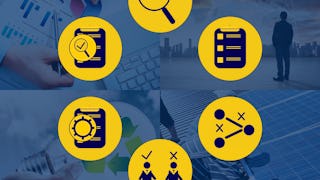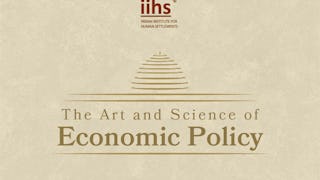This course offers a comprehensive introduction to public policy and the processes through which it is formulated, implemented, and evaluated. It addresses fundamental questions such as: Why do we need public policy? How is it made? What types of policies exist? Learners will explore the political, social, and economic contexts in which policies are developed, adopted, and assessed, gaining insights into how these factors shape outcomes.

Vente anticipée ! Débloquez plus de 10 000 cours de Google, Microsoft et autres pour 160 €/an. Économisez maintenant.


Expérience recommandée
Ce que vous apprendrez
You will understand the public policy-making process, identify issues and assess alternatives using evidence-based approaches and analytical skills.
Compétences que vous acquerrez
- Catégorie : Public Administration
- Catégorie : Ethical Standards And Conduct
- Catégorie : Economics, Policy, and Social Studies
- Catégorie : Public Policies
- Catégorie : Communication Planning
- Catégorie : Strategic Communication
- Catégorie : Policy Analysis
- Catégorie : Environmental Policy
- Catégorie : Governance
- Catégorie : Policy Development
- Catégorie : Advocacy
- Catégorie : Political Sciences
- Catégorie : Program Evaluation
- Catégorie : Social Sciences
- Catégorie : Social Justice
- Catégorie : Behavioral Economics
Détails à connaître

Ajouter à votre profil LinkedIn
juin 2025
14 devoirs
Découvrez comment les employés des entreprises prestigieuses maîtrisent des compétences recherchées

Il y a 8 modules dans ce cours
This course will introduce students to public policy and its processes. Why do we need public policy? How is it made? What are its types, etc. In doing so, we will learn about the context and the environment in which the policies are designed, adopted, implemented, and evaluated. We will examine various theories and frameworks that govern the policy process and learn about the factors that challenge the policy process and outcomes. Students will acquaint themselves with strategies required to influence various stages of the policymaking process. We will integrate relevant policy topics throughout the course to drive home these points. Students will learn about how to communicate to influence policymaking processes.Students will be equipped to identify the characteristics of effective and ineffective policies by examining how government actions may stifle intergenerational mobility, equal opportunity, and better social and economic outcomes. The course will also investigate contexts in which poorly designed public policies may create unexpected consequences such as exclusion or political capture.This course will explore some paradoxes in public policy by focusing on topics that animate many public debates about poverty, unemployment, education, health care, and the environment, among others.
Inclus
2 vidéos2 lectures
In this module, we'll briefly cover a basic introduction to the concept of public policy, aiming to provide a clear definition and understanding of the term. We'll explore the importance of studying public policy, highlighting how it plays a crucial role in shaping society and addressing the needs of the public. Following that, we'll discuss the scope and context in which public policies are formulated and executed, providing insight into the wider framework that influences policy development. Furthermore, we will clarify how public policy stands apart from similar concepts, such as public administration and public management, illustrating the distinctive contributions of public policy. In addition, we'll cover the development of public policy as an individual academic field, exploring its evolution and significance in the realm of contemporary governance along with the methodological challenges. These video lectures give a thorough overview of fundamental concepts, setting a solid foundation for deeper investigation into this vital area.
Inclus
9 vidéos2 devoirs
In this module, we will touch upon the classifications of public policy, which are split into several types that dictate the manner in which governments meet the needs of the public. Initially, we will delve into substantive and procedural policies, examining their functions in the processes of decision-making and execution. Following this, we'll look into both regulatory and self-regulatory public policies, underscoring their significance in governance and adherence. We'll also contrast material and symbolic policies, analyzing their direct outcomes or the values they communicate. Moreover, you will discover the distinctions between policies focused on collective goods versus those tailored for private goods, identifying which are designed for the benefit of the general populace and which cater to particular segments. To conclude, we will discuss distributive and redistributive public policies, focusing on how they distribute resources and modify wealth distribution across the community. Through these video segments, you'll obtain a deeper understanding of the various shapes public policies take and their effects on society.
Inclus
7 vidéos2 devoirs
In this module, we will explore the diverse elements that constitute the policy environment and the roles played by various stakeholders in shaping public policy. The module begins with an introduction to the policy environment, providing an overview of the complex interplay between governmental and non-governmental actors. Learners will examine the roles of official policymakers, including the legislature, executive, administrative agencies, and the courts, and how these institutions influence policy development and implementation. The module will also cover the contributions of non-governmental participants such as interest groups, political parties, research organizations, communication and media, and citizens in the policy process. By the end of this module, learners will have a deeper understanding of the policy environment and the key actors involved in the policymaking process.
Inclus
10 vidéos2 devoirs
In this module, we will briefly look at the seven stages of the policy cycle, guiding the development and implementation of public policies. We will start with identifying and prioritizing issues during agenda setting. The discussion then shifts to the selection of alternatives, the enactment, and the implementation process, shedding light on the methodologies for choosing and applying policy options. We then move on to concepts such as Micropolitics, Macropolitics, and Subsystem politics. We then focus on evaluation and understanding the policy process as a system that offers insights into the assessment of policy outcomes and the complex interrelations within the policy cycle. Towards the conclusion, we cover the actor-oriented approach to policy development and also issues with policy evaluation.
Inclus
12 vidéos2 devoirs
In this module, we'll examine public policy theories and approaches that elucidate policy formulation and implementation. Starting with the institutional approach, which emphasizes the role of governmental structures, we move to group and elite theories highlighting the impact of influential groups and elites in policy-making. We then compare rational policy-making and bounded rationality, showing the difference between ideal and actual decision-making. Additionally, we discuss incremental and normative optimal models, underscoring gradual versus ideal changes, and introduce game theory and the systems approach for strategic and holistic policy perspectives. Finally, public choice theory, applying economic principles to policy decisions, is covered. Through these videos, you'll acquire a deep understanding of the frameworks analyzing public policy.
Inclus
9 vidéos2 devoirs
In this module we will cover the key frameworks and approaches in public policy that help understand policy formulation and implementation. Learners will explore major frameworks such as the Stages Heuristic Model, Multiple Streams Framework, and Institutional Analysis and Development Framework by Ostrom, which focus on policy stages, a convergence of policy components, and institutional roles. The lesson also covers the Advocacy Coalition and Punctuated Equilibrium Framework, explaining policy change through interest groups and stability periods. The second lesson covers policy implementation approaches, including top-down and bottom-up models. Learners will examine the effectiveness of hierarchical control and the role of local actors in policy execution. The role of street-level bureaucrats and their discretion in shaping policy outcomes will also be discussed. By the end of this module, learners will gain a comprehensive understanding of policy frameworks and implementation approaches, enabling them to analyze and engage with policy processes critically.
Inclus
8 vidéos2 devoirs
This module will cover key concepts and methodologies that shape public policy processes, focusing on behavioral science, policy transfer, ethical considerations, and decision-making styles. Learners will examine how behavioral science influences policy design through behavioral issues and nudge theory to encourage better decision-making. The module also covers path dependency and policy transfer and diffusion, emphasizing how past decisions impact present choices and how policies spread across jurisdictions. Ethical considerations and budgeting processes will be analyzed, highlighting their significance in policy planning and implementation. Finally, learners will explore policy-making patterns such as rulemaking, adjudication, and program operations, alongside decision-making styles like bargaining and persuasion. By the end of this module, learners will develop a comprehensive understanding of these aspects, enhancing their ability to engage effectively with public policy challenges.
Inclus
11 vidéos2 devoirs
Obtenez un certificat professionnel
Ajoutez ce titre à votre profil LinkedIn, à votre curriculum vitae ou à votre CV. Partagez-le sur les médias sociaux et dans votre évaluation des performances.
Préparer un diplôme
Ce site cours fait partie du (des) programme(s) diplômant(s) suivant(s) proposé(s) par O.P. Jindal Global University. Si vous êtes admis et que vous vous inscrivez, les cours que vous avez suivis peuvent compter pour l'apprentissage de votre diplôme et vos progrès peuvent être transférés avec vous.¹
Instructeur

Offert par
En savoir plus sur Governance and Society

University of Michigan
 Statut : Essai gratuit
Statut : Essai gratuitO.P. Jindal Global University

Indian Institute for Human Settlements
 Statut : Essai gratuit
Statut : Essai gratuitIE Business School
Pour quelles raisons les étudiants sur Coursera nous choisissent-ils pour leur carrière ?





Ouvrez de nouvelles portes avec Coursera Plus
Accès illimité à 10,000+ cours de niveau international, projets pratiques et programmes de certification prêts à l'emploi - tous inclus dans votre abonnement.
Faites progresser votre carrière avec un diplôme en ligne
Obtenez un diplôme auprès d’universités de renommée mondiale - 100 % en ligne
Rejoignez plus de 3 400 entreprises mondiales qui ont choisi Coursera pour les affaires
Améliorez les compétences de vos employés pour exceller dans l’économie numérique
Foire Aux Questions
Access to lectures and assignments depends on your type of enrollment. If you take a course in audit mode, you will be able to see most course materials for free. To access graded assignments and to earn a Certificate, you will need to purchase the Certificate experience, during or after your audit. If you don't see the audit option:
The course may not offer an audit option. You can try a Free Trial instead, or apply for Financial Aid.
The course may offer 'Full Course, No Certificate' instead. This option lets you see all course materials, submit required assessments, and get a final grade. This also means that you will not be able to purchase a Certificate experience.
When you purchase a Certificate you get access to all course materials, including graded assignments. Upon completing the course, your electronic Certificate will be added to your Accomplishments page - from there, you can print your Certificate or add it to your LinkedIn profile. If you only want to read and view the course content, you can audit the course for free.
You will be eligible for a full refund until two weeks after your payment date, or (for courses that have just launched) until two weeks after the first session of the course begins, whichever is later. You cannot receive a refund once you’ve earned a Course Certificate, even if you complete the course within the two-week refund period. See our full refund policy.
Plus de questions
Aide financière disponible,


